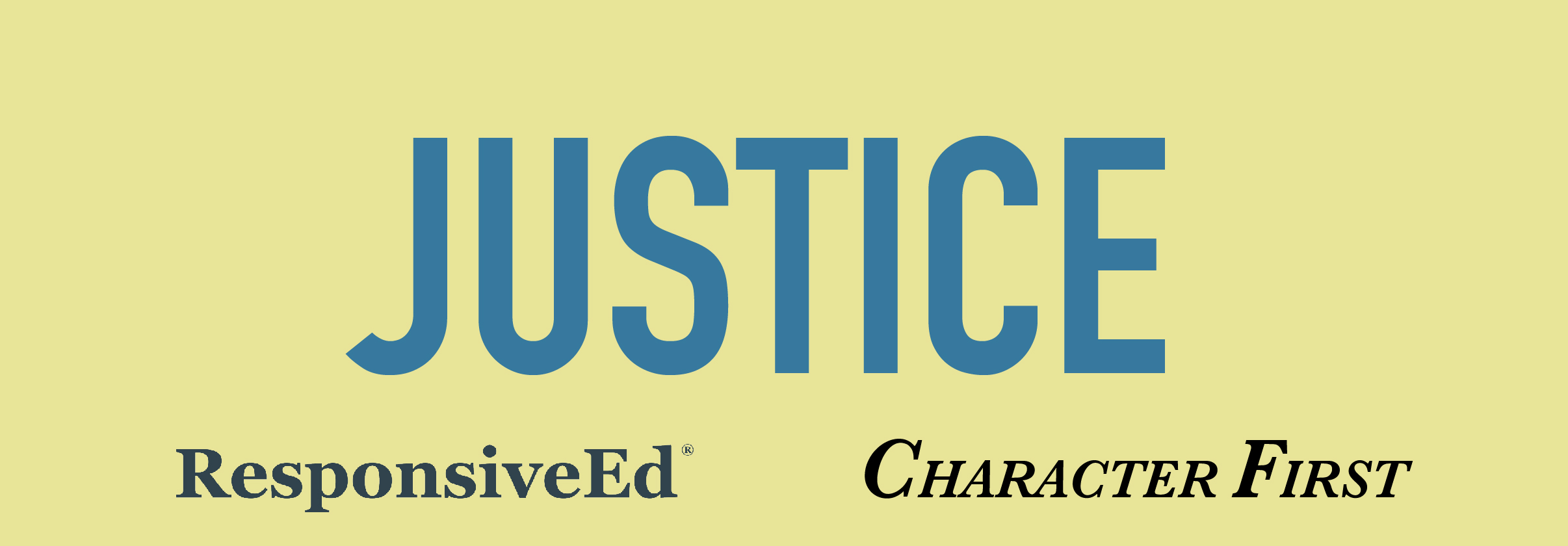Justice is the core character trait for the month of October. From the ancient Greeks to modern society, justice has played a key role in governance and human interaction. Questions of revenge, fairness, rights, law, authority, equality, punishment, mercy and responsibility all relate to justice.
What is Justice?
Justice is respecting the rights of others. It is taking personal responsibility to uphold what is pure, right, and true.
Where does the word come from?
Word etymology: The word justice comes from the Latin word iustitia, from iustus “upright, just.”
Justice in Action: Abigail Adams
 Adams is a familiar American name. We think of two presidents and statesmen. One of the most notable Adams was Abigail, wife of the second President of the United States John Adams. She was an ardent supporter of justice through America’s founding in a time when human rights were still very much uncertain and debated. Always a patriot, she challenged others to question what is just and right in the forming of the United States.
Adams is a familiar American name. We think of two presidents and statesmen. One of the most notable Adams was Abigail, wife of the second President of the United States John Adams. She was an ardent supporter of justice through America’s founding in a time when human rights were still very much uncertain and debated. Always a patriot, she challenged others to question what is just and right in the forming of the United States.
She was an outspoken advocate and believed she should have a voice commensurate with her husband’s position. She was one of the first Americans to argue for property rights for women, which would become the basis for enfranchisement and emancipation. Like a prophet, she spoke to the men of her day, saying, “The passions for liberty cannot be equally strong in the breasts of those who have been accustomed to deprive their fellow creatures of theirs.” She saw injustice in the hearts of men and refused to stand by and watch it take root.
She believed that women were every bit as capable as their fathers and husbands with innate human rights and justice demanded that they should be able to manage their own affairs. It was not always a popular position, but she consistently advocated for it.
The same perspective also led her to take personal responsibility for standing against the injustice of slavery. She lived in a state that had a 150-year history of involvement in the slave trade. She was convinced it was not respecting the rights of others, and like her British contemporary William Wilberforce, she found the voice to say so. During the course of the Revolutionary War, her home state of Massachusetts debated the issue, finally outlawing it in 1783. Her son, John Quincy Adams, introduced no less than 350 anti-slavery petitions to the House of Representatives to get it restricted and outlawed in all states.
That is her legacy. It took courage to stand up for justice. Both suffrage and slavery were highly controversial as the new American republic was being born. It was even more irregular for a woman to take a public stand on these issues. But Abigail Adams knew in her heart what was just and equitable and had the courage to speak truth to her culture.
Quotes from Abigail Adams
“I wish most sincerely there was not a slave in this province. It always appeared a most iniquitous scheme to me — to fight ourselves for what we are daily robbing and plundering from those who have as good a right to freedom as we have.” – Abigail Adams in a letter to John Adams (24 September 1774)
“I feel anxious for the fate of our monarchy, or democracy, or whatever is to take place. I soon get lost in a labyrinth of perplexities; but, whatever occurs, may justice and righteousness be the stability of our times, and order arise out of confusion. Great difficulties may be surmounted by patience and perseverance.” – Abigail Adams in a letter to John Adams (27 November 1775)
“If we do not lay out ourselves in the service of mankind whom should we serve?” – Abigail Adams in a letter to John Taxter (29 September 1778)
Discussion Questions
- What do you do when something is unfair or unjust?
- What do fairness and justice mean? Do they mean everyone gets the same things? How are they connected to rights?
- How is justice connected to equality? Does justice ever demand that you receive unequal consequences for the same offense?
- How is peace connected to justice? How is mercy connected to justice? How is revenge connected to justice? What is the difference between revenge and justice?
- Why do we desire justice?
- What is your responsibility to act justly? Should you only act with justice towards strangers? To your neighbors? To your family? To your friends? To your enemies?
- How do you decide what is just in a particular situation?
- How can you be more just?
Key Concepts Related to Justice
- Fairness: acting in accordance with the rules or standards
- Liberty: the state of being free within society from oppressive restrictions imposed by authority on one’s way of life
- Revenge: the action of inflicting hurt or harm on someone for an injury or wrong suffered at their hands
- Restitution: the restoration of something lost or stolen to its proper owner or recompense for injury or loss
- Rights: a moral or legal entitlement we possess by virtue of being alive that allows us to have or obtain something or to act in a certain way or that which is morally correct, just, or honorable
- Equality: the state of being equal, especially in status, rights, and opportunities
- Click to read about Wisdom, the character trait of September.
- Click to read about Endurance, the character trait of November.
- Click to read about Self-Control, the character trait of December.
- Click to read about Love, the character trait of January.
- Click to read about Integrity, the character trait of February.
- Click to read about Determination, the character trait of March.
- Click to read about Gratefulness, character trait of April.
- Click to read about Humility, character trait of May.




